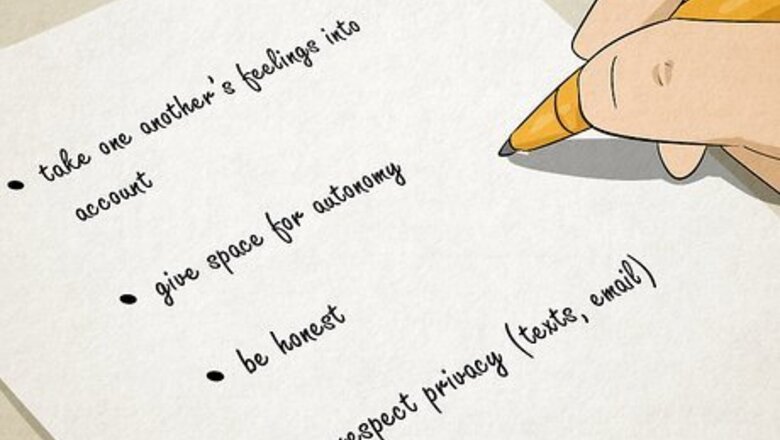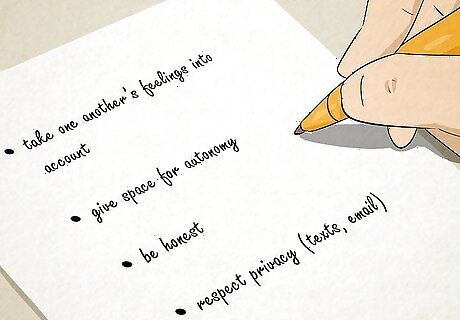
views
Determining Your Privacy Boundaries

Make a list of your boundaries. Before you can set boundaries in your relationship, you need to figure out what your privacy boundaries are. This may involve some self-reflection and consideration on your part. Think about what parts of your life you want to share with your partner and what you want to stay private. Some things that you want private now may change in the future. As your relationship grows and you learn to trust your partner more, you may be more open with them. There's nothing wrong with being more private at first and slowly opening up to your partner.

Outline what behaviors are unacceptable. As your set privacy boundaries with your partner, you should let them know what behaviors are acceptable and unacceptable. You and your partner both should talk about what is accepted in the relationship and what is violating your privacy. For example, listening in on phone calls, looking over your shoulder read texts, or reading your emails may be violations of your privacy. Be specific so you and your partner can understand what each of you need and want. Say to your partner, "There are some things that I would like to remain private. I do not want you reading my texts or emails. These things are off-limits."

Be specific with your boundaries. When you talk about your boundaries, make sure you are specific. Vague boundaries may lead to confusion, miscommunication, and problems in the relationship. Tell your partner exactly what you feel comfortable with and what you don't. For example, you may say, “Do not look through my texts. That is a violation of my privacy” or “Please do not follow me when I go out. That is distracting me and my privacy.”
Communicating With Your Partner

Start a conversation. A lot of miscommunication in relationships stems from not being clear about what your boundaries are. Some people try to hint around their feelings while others assume their partner knows. Since privacy boundaries are so important, make sure to make time to tell your partner what your boundaries are. For example, you may want to tell your partner, “I want to discuss our privacy boundaries” or “We should discuss our feelings about privacy in the relationship.”

Remind your partner that you care for them. When you are setting your privacy boundaries, make sure to tell your partner that you love and care about them. Your privacy boundaries should not make your partner feel alienated or violated. You should be focusing on healthy ways to be in a relationship. Try saying, “I love you and I care about you. However, I need you to respect my privacy” or “I care about you and want to share things with you, but please understand that there are some things I do not want to share with you.”

Insist that your partner sets privacy boundaries. When you set privacy boundaries, it should be done on both sides. You shouldn't be the only one making relationship boundaries. Instead, you both should set boundaries together and respect each other's wants and needs. Tell your partner, "I have stated my privacy boundaries. Now I am interested in what your privacy boundaries are so I can respect them. I understand they may be different than mine, and that is okay." Be aware that your partner's boundaries may be different than yours. For example, you may feel uncomfortable with them posting status updates or photos of you on social media while your partner doesn't care. Your partner may want private time to themselves each day.
Setting Specific Boundaries

Set personal space boundaries. Privacy boundaries aren't just with things like keeping your cell phone private or not listening into phone calls. Privacy also deals with your personal space and sexual boundaries. You should share with your partner what physical and sexual things you are comfortable with and what you aren't. For example, you may not feel comfortable taking a shower or going to the bathroom with your partner in the room. Certain parts of your body may be private and you may not want your partner to touch them. Make sure your partner is aware of this. You may have privacy boundaries that are different when you and your partner are in public than when you and your partner are alone. You may be okay with kissing or touching when alone but not comfortable with doing that in public. You can say, "I love it when you kiss me and touch me when we are home. However, I do not like it when you touch me in an intimate way when we are in public. That violates my privacy boundaries." You may also say, "I do not mind you coming into the bathroom if the door is open. However, if I have closed the door, do not come into the room. If you need me, knock and I will answer you."

Tell your partner about your digital privacy boundaries. Social media, cell phones, and other technology open up many different ways your privacy can be violated. You and your partner should discuss what is appropriate to share and what you do not wish to be shared. This can include anything. Make sure to let your partner know if and what photos are appropriate to post, if they can tweet or post about the relationship, if they can tag you in photos or posts, and if they can follow your friends and family. You should also discuss your boundaries about sexting or revealing photos. For example, try saying, "I do not want you posting pictures of me on social media unless I okay them first" or "Please do not sext me. I am not comfortable with that."

Discuss how you feel about sharing items. Just because you and your partner are in a relationship doesn't mean everything you own belongs to each other. You both should talk about what items are off limits and which are okay to share. For example, you may feel okay about sharing clothes, books, or food, but you don't feel comfortable sharing money or a toothbrush. Tell your partner, "Though we share the grocery expenses and most of the food, this box of cookies is just for me. Please respect that." Even if you live together, you should establish privacy boundaries about your belongings to make sure you don't step on each other's boundaries.

Spend time with your friends and family. Part of setting privacy boundaries is making time for you to spend with your other friends. You and your partner should be able to spend time apart with your other friends. Find time to be with friends and family outside of your partner without having to check in or detail everything that happened. You should not have to report back to your partner about what you did or talked about. If you feel like sharing details, that is your right. However, your right to privacy includes what you do with your friends and family.

Keep passwords private. No matter what level of relationship you and your partner have, you may want to keep your passwords to social media, your phone, or accounts private. Giving your partner passwords removes the privacy you have in your own digital space. Even if you trust your partner, keeping passwords a secret is a way to ensure your privacy. For example, if your partner knows your social media password, they may be able to post without your permission or read your private messages. It may also lead to jealousy. Allowing someone to know your banking password may lead to someone taking your money without your permission. If you give out your website passwords, someone may buy things on or access your private accounts.
Addressing Boundary Violations

Be honest with your partner if they violate your boundaries. If your privacy boundaries have been violated, you should sit down with your partner and talk to them. You need to tell your partner what they have done that has upset you. Explain that since you have had this conversation before, they should be aware of your boundaries. For example, try saying, "You have violated my privacy by going through my phone without my permission. We have discussed before that my phone is off-limits. This behavior is not okay."

Remind your partner of your boundaries. During this conversation, you may need to remind your partner of your privacy boundaries. This ensures that you both are on the same page and they understand what is acceptable and unacceptable behavior. Encourage your partner to repeat their privacy boundaries, too. For example, you may say, "We have discussed this before, but I want to return to it. It is very important that we remember each other's privacy boundaries and respect those wishes."

Consider ending the relationship if your partner doesn't respect your boundaries. If you have repeatedly told your partner about your privacy boundaries but they continue to violate them or disrespect you, you may consider ending the relationship. A person who doesn't respect your wants and needs may not provide the kind of healthy relationship you need. A person who violates your privacy boundaries may not respect you and end up violating other boundaries, which could harm you in the long run. Remind yourself that your boundaries are important. You deserve to have your boundaries respected. You do not have to accept someone not respecting your boundaries.




















Comments
0 comment